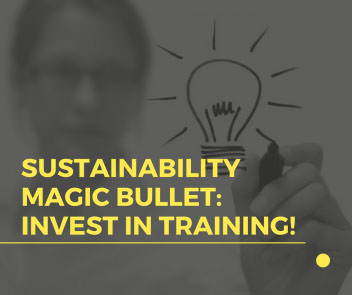By Rosalinda Sanquiche
How long can we make this list?
- Improve efficiencies
- Increase productivity
- Build public appeal
- Increase shareholder value
- Aid in employee recruitment
- Increase employee satisfaction and retention
- Promote team building
- Improve quality of work
- Innovate
- Lower business risk
- Save labor
- Save money
- Increase competitive edge
- Save time and cost on supervision
- Create a marketing advantage
- Give back to the community
Want to take a huge step toward sustainability? Improve your workforce? Strengthen a community? Ensure sustainable profits?
Sustainability training such as the foundation course offered by the Sustainability Academy offers these benefits and more. Training is of special interest to professionals who want to improve their skills and update their knowledge in Corporate Social Responsibility with practical information on the business case for sustainability; the importance of stakeholder engagement; the use of standards and guidelines to design and implement successful sustainability strategies organization-wide. Without training, sustainability is more a vision than a goal. Sustainability is not a vague term – it is a tangible process which can be taught and implemented to improve corporations and communities.
The ROI on training is indisputable:
Increased public appeal helps increase market share. A Nielsen survey in 2015 found that 72% of Millennials “are willing to pay more for products and services that come from companies who are committed to positive social and environmental impact.”
More customers lead to greater shareholder value. The American Society for Training and Development found that an increase of $680 in a company’s training expenditures per employee generates nearly a 6 percent improvement in shareholder return. Researchers found that firms investing the most in training and development yielded a return 45 percent higher than the market average when compared to the S&P 500 for the same period, along with higher profit margins and higher income per employee.
Increasing efficiencies is a profitable and “low-hanging” fruit. After training, an HSBC “Climate Champion” noticed that computers left on overnight were a huge energy drain. The company implemented software to automatically shut down computers along with an awareness program which together saved 4 million kilowatts per year of electricity and about 900 metric tons of carbon dioxide, which shaved $332,000 on energy bills.
Increasing productivity through better morale, professional development and team building makes for more satisfied employees. Research has found that a 2-percent increase in productivity can net a 100 percent return on investment in training (CompTIA and Prometric). For every dollar spent on training, Motorola found nearly a 30 percent gain in productivity over three years. Motorola training also reduced costs by over $3 billion and increased profits by 47 percent.
Training also leads to better retention as Louis Harris and Associates found, showing that 41% of employees without training opportunities plan to leave in one year versus only 12% of those who felt they had excellent training opportunities. An AON survey found that employees rank “opportunities for personal growth” ahead of salary!
According to Krista Badiane at the National Environmental Education Foundation, a program of the EPA, “There seems to be a huge growth of interest among companies to not just keep the environmental initiatives within a subset of employees, but to make it a pervasive part of the corporate culture.” Companies are looking for ways to bring this training in-house to their employees and out into the community as part of their social commitment and philanthropy.
The Sustainability Academy offers an online option that is affordable and efficient. Many companies want to educate local communities beyond their staff. With the Sustainability Academy, companies can co-brand the trainings to meet organizational needs, increasing public appeal and improving lives for the long-term. They can tailor the offering specific to their needs, for example, providing education on sustainability in Supply Chains to key suppliers. The ROI from sustainability education provided by the Sustainability Academy is tangible. After the certified foundation course, participants receive a diploma as a sustainability practitioner which enhances their professional development.
Whether as a philanthropic effort or company enhancement, there needs to be a critical mass of those who understand sustainability and all its components. Only then can we all benefit from increased productivity, increased morale and improving our carbon footprint. The Sustainability Academy has set the ambitious goal of generating this critical mass by training 100,000 sustainability practitioners by 2020!
Sponsor a Sustainability Academy cohort and let’s join forces for our common good!!







